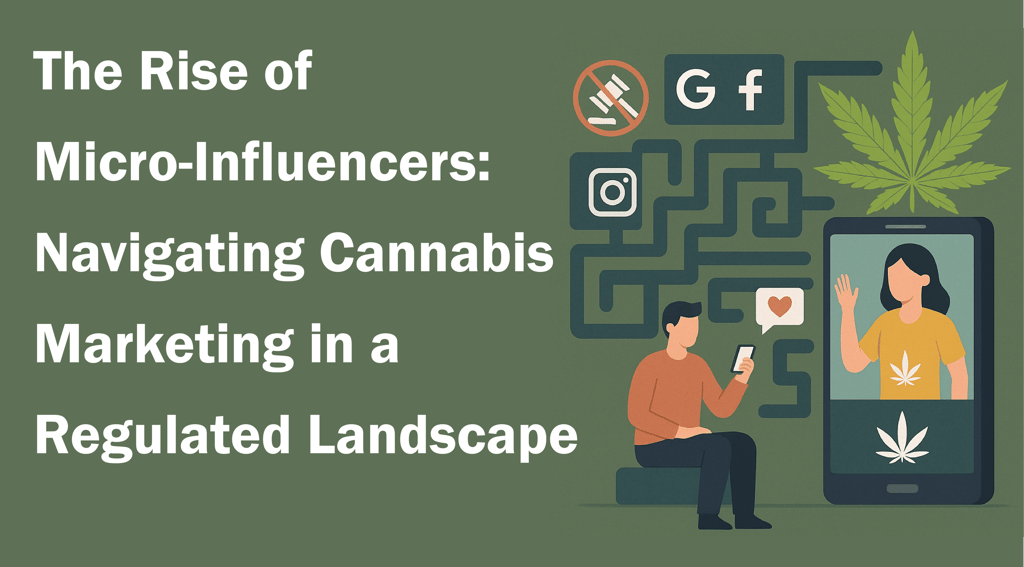The Rise of Micro-Influencers: Navigating Cannabis Marketing in a Regulated Landscape
William Kanistras
4/25/20256 min read


Marketing in the cannabis industry has always been a challenge. With so many legal restrictions in place, especially when advertising on mainstream platforms like Instagram, Facebook, and Google, getting your message out can feel like navigating a maze. From cultivation to high-volume retail and everything in between, the entire supply chain faces unique hurdles with marketing products and reaching customers.
As the digital landscape evolves, a new solution has emerged: micro-influencers. These smaller, highly engaged audiences are becoming a strategic asset for cannabis brands looking to make a real connection with their target market while staying compliant with regulations.
As someone deeply involved in the cannabis industry, I have seen firsthand how marketing strategies have shifted over time. Before mainstream legalization, cannabis businesses had to rely on word-of-mouth marketing, especially in niche markets. But today, the landscape has evolved dramatically. For everyone, from small legacy operations to MSOs, and at every stage of the process, micro-influencers have become one of the most effective ways to market, a trend that has gained popularity across the marketing world.
What is exciting is how micro-influencers are playing a key role across the entire cannabis supply chain. No longer limited to retail or consumer-facing content, these influencers are helping businesses at every level, from seed selection and cultivation methods to product processing, packaging, and sales.
Trust and authenticity are key in this industry, and micro-influencers deliver both. Whether you are educating your audience on sustainable farming practices or helping a dispensary better connect with its local community, micro-influencers play a pivotal role in establishing credibility at each step of the cannabis journey. In a heavily regulated space like ours, using these highly engaged, smaller audiences is not just a smart move; it is becoming necessary for cannabis brands looking to stand out and build genuine connections.
Why Cannabis Marketing Is Uniquely Challenging
Cannabis marketing presents unique challenges due to the complex regulatory environment that businesses must navigate. In most regions, cannabis remains heavily regulated, with strict limitations on what can be advertised regarding cannabis products. Major advertising platforms such as Instagram, Google Ads, and Facebook enforce rigid guidelines and often impose outright bans on cannabis-related content.
State-by-state regulations add another dimension, creating a patchwork of rules that cannabis brands must interpret and follow. In some states, advertising cannabis products is allowed, while in others, the restrictions are significantly more stringent. Ensuring compliance can become a logistical burden, and violations may result in substantial fines or lasting reputational harm.
In addition to legal challenges, cannabis still carries a degree of stigma in many communities. Although public perception has improved in recent years, there is still a strong need for education, particularly around the benefits of cannabis and its legal status. Micro-influencers can help address this need by providing trustworthy, relatable, and well-received content.
Micro-Influencers: Who They Are and Why They Matter
A micro-influencer typically has a social media following ranging from 1,000 to 100,000 people. What makes them so valuable, especially in the cannabis space, is the level of engagement they can generate with their audience. Unlike macro-influencers or celebrities who may have millions of followers, micro-influencers often see much higher interaction rates, which translates into deeper relationships with their followers.
These influencers are often seen as more authentic because they are closer to their communities. Their followers tend to be highly engaged and trust their opinions. In the cannabis space, where transparency and trust are everything, micro-influencers can be a bridge between brands and consumers.
For example, a cannabis retail business might partner with a micro-influencer passionate about sustainable farming practices. This influencer could share insights into where and how the products are grown, which helps educate their audience and build credibility for the brand. A dispensary might work with a local influencer with a loyal following in the area, creating content highlighting the store’s product selection, customer service, and overall shopping experience.
Engagement vs. Exposure: Rethinking Cannabis ROI
When most businesses think about marketing, they focus on traditional metrics like impressions, clicks, and reach. However, with micro-influencers, the real value is not in exposure but in engagement.
A post from a micro-influencer may not reach millions of people, but the people who do see it are likely to be much more engaged. Micro-influencers tend to have higher engagement rates than macro-influencers because their audiences feel more personally connected to them, leading to more meaningful interactions in comments, shares, and purchases.
For example, a cannabis manufacturer might team up with an influencer to showcase the production process of their concentrates. Instead of simply showing a flashy ad, the influencer might share a behind-the-scenes look at the production process, giving their followers a more authentic and transparent experience. This type of content fosters trust and builds stronger brand loyalty than a more traditional, broad-reaching marketing campaign ever could.
Compliance Checklist for Working with Influencers
Compliance is one of the most critical aspects of any cannabis marketing campaign. Given the strict regulations, your brand and influencers must adhere to all relevant laws, regulations, and platform terms and conditions.
Below is a quick checklist to keep in mind when working with micro-influencers:
FTC Disclosures: Influencers must disclose when they are compensated or given free products. Look for tags like #ad, #sponsored, or #partner.
Avoid Health Claims: Influencers cannot make health or medical claims about cannabis products without the proper certifications or supporting evidence. Claims regarding the curing or alleviating of specific conditions are prohibited.
Age Restrictions: Ensure that the influencer’s content is only accessible to audiences of legal cannabis consumption age in their jurisdiction. Utilize age-gate features or platform settings to prevent underage access.
Platform Guidelines: Social media platforms have guidelines regarding cannabis-related content. Even if your influencer follows all of the rules, the platform might still take down the post if it violates its terms of service.
By working closely with your influencers to ensure compliance, you can safeguard your brand and avoid costly mistakes.
How Brands Are Winning Across the Entire Supply Chain
Some of the most successful cannabis brands today have figured out how to operate within regulatory constraints while effectively engaging with micro-influencers. It’s not just dispensaries and wellness brands; the entire cannabis supply chain, from cultivation to high-volume retail, is leveraging micro-influencers to build credibility, increase brand loyalty, and navigate advertising restrictions.
Below are some examples from across the cannabis ecosystem:
Cultivation & Nursery Partnerships:
A local cultivation operation teamed up with micro-influencers specializing in home-growing and organic farming. These influencers documented their journey from cloning to flowering, showcasing the exceptional quality of the operation’s starter plants. This approach built trust within a targeted audience of experienced growers who prioritized transparency in cultivation practices.
Processing and Manufacturing:
A cannabis concentrate manufacturer worked with micro-influencers to highlight the clean, sustainable extraction processes they used. Influencers focused on wellness and conscious consumption discussed the product manufacturing process, emphasizing purity and integrity. The influencer community helped spread awareness to consumers concerned with how cannabis products are produced and processed.
Retail & Dispensary Engagement:
A retail chain took a unique approach by collaborating with influencers who shared their favorite shopping experiences at the dispensary. These influencers created content around product selection, educating their audiences about the products available in the store and the retail environment itself. By featuring dispensary staff and product experts, the campaign built an atmosphere of trust and professionalism.
Distribution & Wholesale:
A cannabis distributor working in wholesale and retail spaces tapped into the educational power of influencers to help explain the intricacies of cannabis logistics. Micro-influencers, ranging from industry educators to entrepreneurs, created content that outlined how cannabis products move from cultivation to retail shelves. It added a layer of transparency and legitimacy to the often opaque world of cannabis distribution, helping retailers and consumers improve their understanding of the supply chain.
Infused Products & Edibles:
A brand specializing in infused edibles and tinctures partnered with cannabis chefs and lifestyle influencers to create engaging content. These influencers showcased how to cook with cannabis products, highlighting their health and wellness benefits. The campaign promoted the products and aimed to educate consumers on responsible and enjoyable consumption practices.
Compliance & Sustainability:
A compliance-focused cannabis consultancy worked with influencers in the eco-conscious space to promote sustainable practices within the industry. Micro-influencers, particularly those focused on sustainability and ethical consumption, advocated for compliance in environmental practices. From sustainable packaging to reducing waste in cultivation, these influencers educated their followers on how these practices improved the integrity of the entire supply chain, from cultivation operations to the final product on the shelf.
By expanding micro-influencer strategies across the entire supply chain, from cultivation and processing to distribution, retail, and compliance, cannabis brands can build stronger, more sustainable relationships with their audience. These strategies not only drive conversions but also foster a deeper understanding of the complexities involved in bringing cannabis from seed to shelf. In an industry still figuring out its footing, micro-influencers offer a unique, effective way to build trust at every level of the supply chain.
Micro-influencers are no longer just a trend in cannabis marketing; they have become a strategic necessity. As advertising restrictions continue to evolve and consumer expectations increase, brands that understand how to use micro-influencers to build authentic connections with their audience will gain a clear competitive advantage. Whether operating in cultivation, retail, or any scope, micro-influencers offer a valuable and compliant way to communicate your brand story and engage with customers.
Cannovise helps cannabis operators navigate complex regulations and scale with confidence. We provide strategic consulting across compliance, operations, and development, supporting the entire supply chain from seed to sale.
Your partner in cannabis compliance and operations.
info@cannovise.com
© 2025. All rights reserved.
